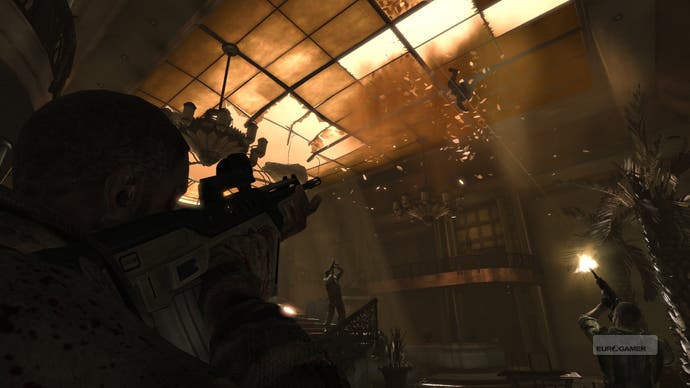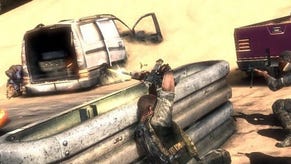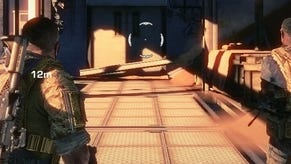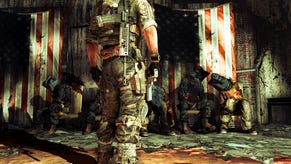Spec Ops: The Line
SandShock?
This glass ceiling mechanic looks like it will play a relatively significant part in the game, as we're later shown how both squad and enemy AI adapts to the tactical options it affords - shooting out floors beneath unsuspecting troops, for example, or creating new routes through buildings. We're shown another aspect of it towards the end of the demo, as the team moves into another lobby with a high glass wall barely holding back a 20-metre sand dune. Several captives are lined up below for execution, surrounded by guards, with an enemy taking up a position at a turret gun as you enter. The traditional, ethically correct approach, is to shoot the grunt on the gun, sniping him before he opens up on the innocents below. But what about that window? A well-placed grenade would shatter the glass and drop a gritty wave of death over everyone in the lobby, prisoners and guards alike.
Yager's demo-player follows accepted social mores and plugs the would-be executioner before cleaning up the guards, but shortly afterwards the game triggers the event itself as rocket-wielding troopers assault your position, breaking the glass and allowing the impressive physics alterations the team has made to Unreal Engine 3 to do their work. We're promised, however, that this sort of decision is very much in your hands.
Walker's squad-mates are more than just tools to accomplish the mission, too; their development and the group dynamic are a significant narrative device. Davis goes on to say that the two soldiers accompanying you are "equally as important as the main character". The Delta Force framework means hierarchy is dealt with very loosely, so these brothers in arms are friends rather than colleagues, and the interplay will allow a much great depth to their interaction.
Commands which deal with their movement - a semi-contextual system accessed from the cursor rather than a radial - are still in need of work but already in promising shape, allowing the player to pick out individual enemies for sniper fire or suppression, while your team-mates use cover intelligently when instructed to move. It all implies depth without the need to micromanage. Your squad-mates don't have complete invulnerability to enemy fire, but Davis is coy at to whether they ever fully expire and end the game. He's willing to say they're indispensable to the story though, and that there's a healing mechanic for reviving fallen allies, but details will come later.
There are even fewer details on multiplayer, although Davis does confirm that a separate team is working on both co-operative and competitive experiences. Whether these take place within the campaign story isn't clear, but hints are certainly dropped that we'll get a narrative-driven co-op.

Strolling away from the sand-clogged and sun-bleached expanses of videogame Dubai into the cosy Yuletide kitsch of Christmasy Berlin again afterwards, another of Davis' comments springs to mind. Asked about sources and influence, Davis mentions Heart of Darkness again, but also brings up Generation Kill - particularly David Simon and Ed Burns' HBO adaptation of the Evan Wright book - as a key influence on Yager's approach to the combat experience: the eye of a political maelstrom that governs their existence despite offering no recourse for input. I don't know about you, but that's enough to keep me interested until the studio opens its doors again.
Spec Ops: The Line is due out for PC, PS3 and Xbox 360 next year.








